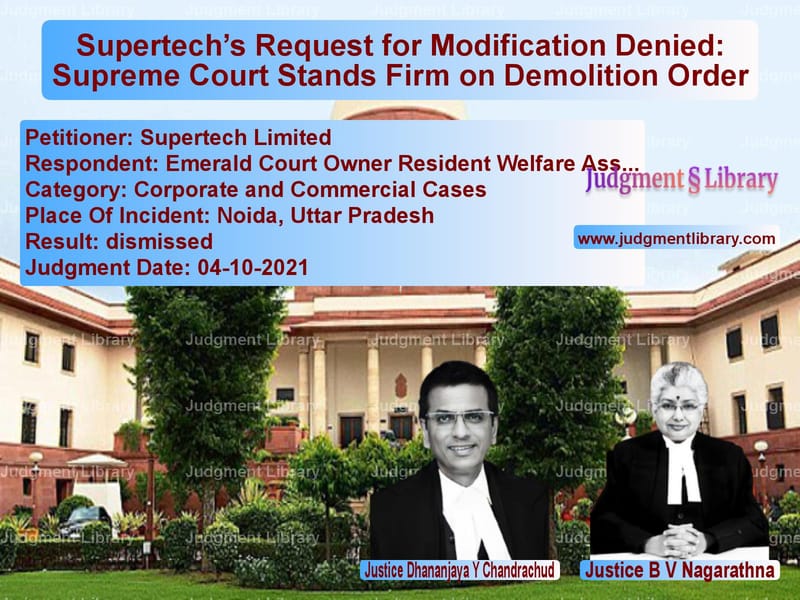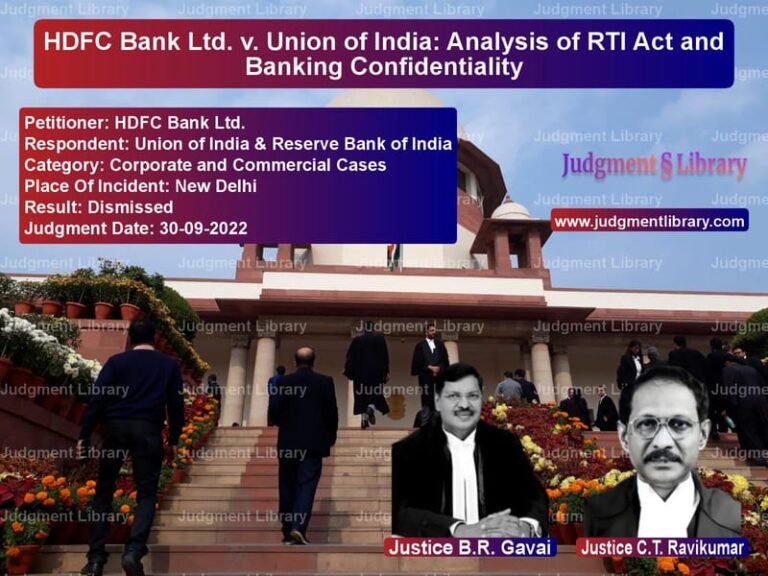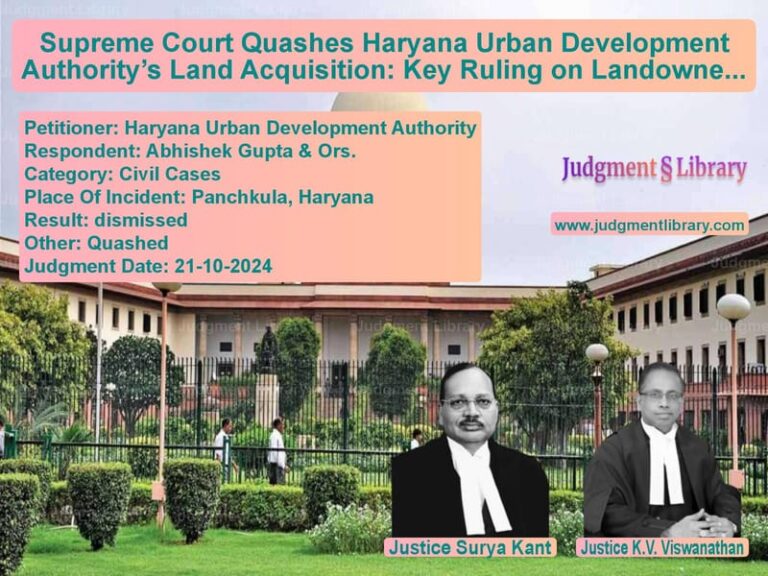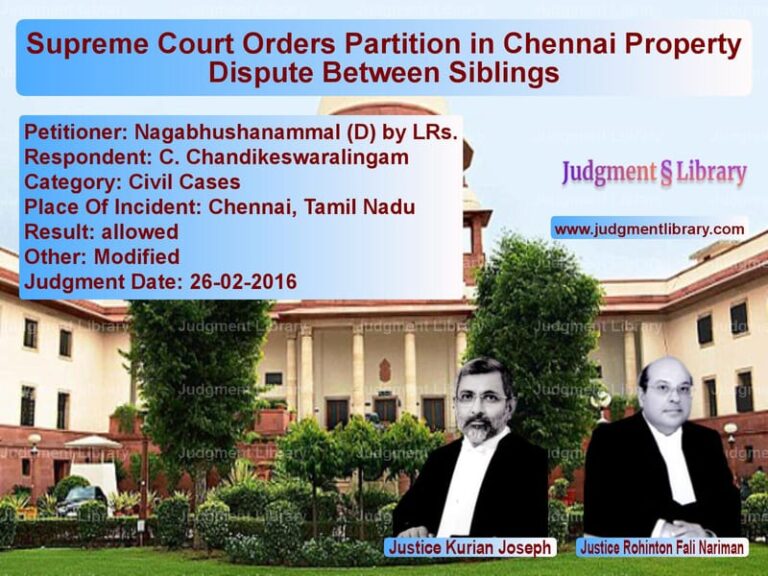Supertech’s Request for Modification Denied: Supreme Court Stands Firm on Demolition Order
The Supreme Court of India, in the case of Supertech Limited vs. Emerald Court Owner Resident Welfare Association & Ors., dealt with a miscellaneous application filed by Supertech Limited seeking modification of the Court’s earlier judgment dated August 31, 2021. In its application, Supertech Limited sought permission to demolish a part of Tower T-17, while retaining Tower T-16, instead of demolishing both towers as previously ordered. The application was dismissed by the Court, emphasizing the importance of complying with the original judgment.
Background of the Case
The dispute began when the construction of Towers T-16 and T-17 in the Emerald Court project in Noida was challenged by the residents’ welfare association. The construction was alleged to have violated minimum distance requirements under the applicable building regulations and fire safety norms. Furthermore, the construction of these towers infringed upon common garden areas and was believed to reduce the undivided interest of the flat owners in common areas.
After a thorough examination of the case, the Supreme Court upheld the demolition order for Towers T-16 and T-17, concluding that the construction had been illegal and violated building regulations. The Court directed that the towers be demolished within three months, with the cost of demolition to be borne by the appellant (Supertech Limited), along with other compensatory measures for affected flat owners.
Supertech’s Application for Modification
In the present Miscellaneous Application No. 1572 of 2021, Supertech Limited sought modification of the original order, proposing to slice a portion of Tower T-17 to ensure compliance with the minimum distance requirement and the green area requirement. Supertech requested that Tower T-16 be retained in its entirety, with only a part of Tower T-17 being demolished.
Supertech argued that this proposal would address the violations found in the original construction, while ensuring that the project’s completion was not unduly delayed. They further requested a status quo be maintained with regard to Towers 16 and 17 until final orders were passed in this application.
Legal and Technical Arguments
Appellant’s (Supertech Limited) Arguments:
- The construction of T-16 and T-17 violated the building regulations and fire safety norms, but the company had taken steps to address these violations.
- By demolishing a portion of Tower T-17, the company would comply with the minimum distance requirement and green area requirement while retaining the other portions of the towers.
- The proposal for partial demolition of Tower T-17 was a feasible solution that would ensure compliance with the Court’s judgment.
- Supertech requested that status quo be maintained in respect of Towers T-16 and T-17 until final orders were passed, to prevent further disruption of the project.
Respondent’s (Emerald Court Owner Resident Welfare Association) Arguments:
- The respondents argued that Supertech’s request for modification was not legitimate, as the violations in the construction of Towers T-16 and T-17 were severe and could not be remedied by partial demolition.
- The original order, which mandated full demolition, was based on the principle that the towers were constructed illegally and violated building norms.
- The respondents further argued that Supertech was attempting to avoid full compliance with the Court’s order and that the modification request should be dismissed.
Supreme Court’s Ruling
The Supreme Court dismissed the application filed by Supertech, affirming the original order for the full demolition of Towers T-16 and T-17. The Court made the following observations:
On the Proposal for Partial Demolition:
The Court acknowledged that Supertech’s proposal to slice a portion of Tower T-17 could potentially address the minimum distance and green area violations. However, the Court emphasized that:
“The violations were not minor and could not be rectified merely by partial demolition. The safety norms and the principles of urban planning cannot be compromised, and the decision to demolish both towers was final.”
On Maintaining Status Quo:
The Court rejected Supertech’s request to maintain status quo, stating:
“The demolition order is clear and must be enforced within the prescribed time frame. No further delay can be afforded, as it is imperative for the public interest that violations of building regulations be rectified.”
On the Role of the Court in Upholding Building Regulations:
The Court emphasized that it had already considered the gravity of the violations and that the direction for demolition was a necessary measure to uphold the integrity of building regulations and to prevent further harm to the residents and the community at large:
“The principles of urban planning and construction regulations must be upheld at all costs. The decision to demolish both towers was made after thorough consideration of the violations, and no further deviation from this decision will be allowed.”
Read also: https://judgmentlibrary.com/corporate-dispute-over-shares-supreme-court-upholds-nclat-ruling/
Impact of the Judgment
The judgment has wide-ranging implications for real estate developers, urban planning authorities, and residents affected by illegal construction:
- The decision reiterates the importance of compliance with building regulations and fire safety norms, particularly in high-rise residential buildings.
- The judgment affirms that partial solutions, such as slicing portions of non-compliant buildings, cannot substitute for full adherence to safety and urban planning regulations.
- The Court’s ruling highlights that judicial orders for demolition must be respected and enforced promptly, preventing developers from evading the consequences of non-compliance through procedural delays.
- It also stresses the importance of maintaining transparency and accountability in the construction process, especially when it affects public safety and welfare.
Conclusion
The Supreme Court’s decision in the Supertech Limited vs. Emerald Court Owner Resident Welfare Association case reaffirms the importance of adhering to urban planning norms and construction regulations. The Court’s rejection of the proposal for partial demolition and its insistence on full compliance with the demolition order serves as a strong message about the importance of regulatory adherence in real estate development. The ruling also underscores the need for developers to act within the boundaries of the law, ensuring that public safety is prioritized over project completion or financial interests.
Petitioner Name: Supertech Limited.Respondent Name: Emerald Court Owner Resident Welfare Association.Judgment By: Justice Dhananjaya Y Chandrachud, Justice B V Nagarathna.Place Of Incident: Noida, Uttar Pradesh.Judgment Date: 04-10-2021.
Don’t miss out on the full details! Download the complete judgment in PDF format below and gain valuable insights instantly!
Download Judgment: supertech-limited-vs-emerald-court-owner-supreme-court-of-india-judgment-dated-04-10-2021.pdf
Directly Download Judgment: Directly download this Judgment
See all petitions in Company Law
See all petitions in Corporate Governance
See all petitions in unfair trade practices
See all petitions in Judgment by Dhananjaya Y Chandrachud
See all petitions in Judgment by B.V. Nagarathna
See all petitions in dismissed
See all petitions in supreme court of India judgments October 2021
See all petitions in 2021 judgments
See all posts in Corporate and Commercial Cases Category
See all allowed petitions in Corporate and Commercial Cases Category
See all Dismissed petitions in Corporate and Commercial Cases Category
See all partially allowed petitions in Corporate and Commercial Cases Category







